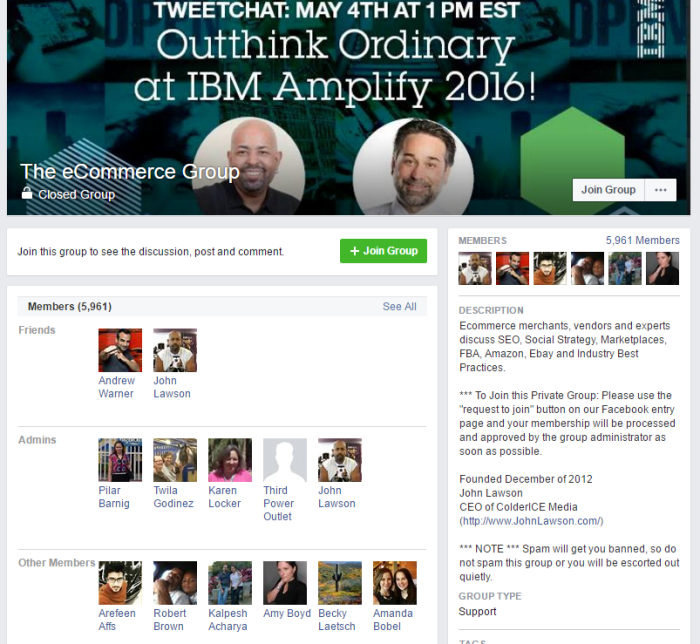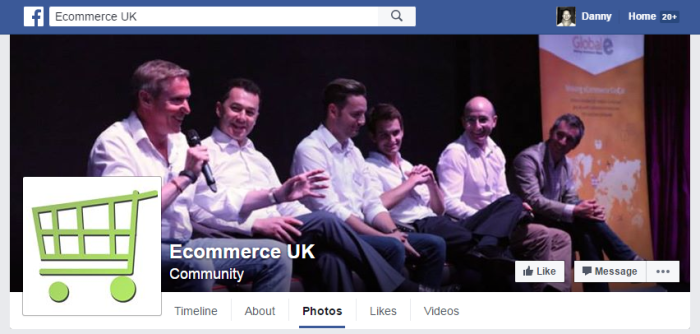Smart Discussions: How 3 Super Connectors Host the Largest Online Conversations about Ecommerce
Roughly a decade ago, Harry Joiner, founder of EcommerceJobs.com, took over the Ecommerce and Online Marketing Experts group on LinkedIn. At the time, the original creator of the group felt overwhelmed; with a day job, it became hard to juggle all of the different responsibilities associated with being a LinkedIn group administrator. So, the group’s founder passed the torch onto Joiner. Today, the group has nearly 83,000 members and may very well be the largest Ecommerce group on the platform.
Challenges & opportunities with large scale participation
According to Joiner, “Initially, the group existed to simply connect members with one another and give them a way to identify each other as online marketing enthusiasts.” Very quickly though, the group’s popularity grew. The biggest surprise here is: “The group’s growth has been mostly organic,” says Joiner.
I, myself, am a member and discovered it two or three years ago when I was searching for lively discussions about Ecommerce online. For me, the process was as simple as searching the term “Ecommerce” within LinkedIn and filtering the results to show groups only. Superficially, I was drawn to the fact that it had tens of thousands of members. Upon further inspection, I noticed many of my connections were already members of the group too. With that social proof, I was sold.
Of course, what keeps members coming back for more is the active conversations about current issues and trends affecting Ecommerce businesses everywhere. Joiner shares, “For many years, one of the value adds I brought to the group was curation and editorial.” LinkedIn’s latest policy updates, though, have been particularly unfriendly towards group admins. “Until LinkedIn changed its policies toward group postings, what members benefited from most – I think – is that I was extremely rigid about what got posted in the group,” explains Joiner.
He adds, “Today there is an intense amount of content spam being posted by people who belong to the group only to spam it. Initially, I policed the postings very strictly, and I did so bearing in mind the group’s purpose plus the identity and reputation of each person contributing a posting. Now, most people can spam the group and it’s up to me to remove their spam post (as opposed to preventing that posting from going live in the first place). It’s much more difficult to remove a spam post and it requires more clicks. It’s an extremely time-consuming thing to do that given the number of posts the group receives each day.”

Indeed, a quick scroll through the group’s latest postings reveals an almost endless log of self-promotional postings. This includes one post from a group member who published the word: test. As tempted as I was to click “like,” my better judgment prevailed.
On the bright side, every once in awhile you stumble upon stimulating conversations about the latest developments in Ecommerce marketing or technology. Joiner’s favorites include discussions about Ecommerce platforms and integrated customer acquisition. Sadly though, those are now few and far between. “I hate that LinkedIn has usurped my authority as an editor,” Joiner laments. “Pretty much, anybody can post anything. I think that seriously undermines the quality of group participation.”
In thinking about the future, where Joiner sees opportunity is in a policy reversal, which puts power back in the hands of group admins, and in the ability to apply virtual reality to social networking. He believes, “Ultimately, it makes sense to try to integrate virtual reality with groups. Virtual tradeshows. Virtual meetups. Not sure how far off something like that is, but based on what I know of video and making human connections, it makes sense to integrate VR with community.”
Forming a mastermind group
In December 2012, Ecommerce enthusiast John Lawson formed The Ecommerce Group on Facebook. The motivation behind this move was simple. Lawson simply wanted to create conversations that he and 30 of his closest friends could participate in about selling products online. A group would limit the noise and clutter of just posting thoughts on each other’s Facebook walls. Furthermore, it would build a safe and closed environment in which members could talk candidly about their business problems.

Soon after the group was launched, members began inviting their friends. After the first month, the group had more than 100 participants. Today, The Ecommerce Group is nearly 6,000 strong with five admins overseeing new and ongoing conversations, and policing spam.
Throughout the past few years, Lawson and company have learned quite a bit from each other. They’ve even worked together to adapt to the ever-evolving Ecommerce landscape. “Early on, members had their stores on eBay,” says Lawson. “Over the years there has been so much spread with the advent of Amazon.” He adds that platforms and marketplaces like Etsy and Teespring have led to the development of many new crafts-based businesses. These days, many more online store owners host their stores on their own websites instead of on eBay.
“It’s no longer about finding a product and selling a product or reselling old stuff,” notes Lawson. “It’s more about creating a product and creating businesses. I’m seeing the evolution and the growth of the industry. People are starting to see their own entities grow up.” And this has affected what goes on within The Ecommerce Group on Facebook too. “Now, the conversation is more mature,” shares Lawson.
As the industry changes, Lawson believes the group will continue to play a crucial role in supporting Ecommerce experts, merchants and vendors. Moving forward, he hopes to keep the group vibrant and its content fresh. And that may mean expanding it to other social platforms. Facebook, originally, was an obvious choice, and that is because users are constantly on Facebook and are engaged with the platform. Facebook’s News Feed algorithm automatically surfaces interesting threads that members may want to read and participate in.
Lawson categorizes some of the best conversations he has seen within the group as “My house is on fire” discussions. These are typically posts from store managers who have urgent, pressing issues and are in need of serious help. At the same time, this is when other members drop everything they are doing to come to their peer’s rescue and share their very best advice. Lawson describes, “When someone truly needs to take action, others give the best advice and share the most actionable things they need to do at that moment versus just a typical blog post about ‘5 ways to do X.’” He also says that one of the group’s best use cases is sourcing help with you are in a tight spot; when someone has a specific problem, they can share it and have a handful — or a dozen — of other members actively offering solutions to address that unique situation.
Merging online conversations with offline events
When Martin Newman, CEO of Ecommerce strategy consultancy Practicology, founded his business in early 2010, he also sought to “create a forum for collaboration and thought leadership, for the growing number of people who were working in Ecommerce roles in the UK.” So, he launched the Ecommerce UK group on LinkedIn.
To recruit its first members, Newman tapped his personal connections. “I already had a strong network of senior Ecommerce executives, suppliers and other influencers such as journalists and head hunters who were focused on the space. Reaching out to these influencers first created some critical mass, and also gave the group authority by association. This then pulled in many members in more junior roles, who were not necessarily senior enough to attend paid-for Ecommerce conferences or other in-person networking events.” With approximately 9,600 members, the group is bigger than ever.
Early on though, Newman had the idea to merge online networking with offline gatherings. “We began to run events off the back of the group, and until this year were running three evening networking events with high-profile speakers each year,” tells Newman. “These events were free to attend for retailers and consumer brands, and ticket costs for suppliers and other consultants were kept low. Over the years we’ve delivered a huge amount of free content and facilitated introductions and conversations at our events. We’ve had Ecommerce directors, marketing directors and even CEOs of digital businesses as speakers, and have always encouraged our speakers to deliver content that’s actionable – telling the group about things they can learn from or quickly adopt themselves.”

Whilst the group lives on LinkedIn, it may be fair to say Ecommerce UK is platform agnostic. Newman notes, “We actually use LinkedIn, Twitter, Facebook, and SlideShare to support the group events. LinkedIn is the platform for marketing events, Twitter allows us to share content with a wider audience on the night [of each event], and we use Facebook as a platform to share pictures from the events. We follow our own advice, and let our members engage with us wherever they like.”
But like Harry Joiner, Newman has his reservations about LinkedIn. “LinkedIn is making it increasingly difficult to run the group in the way we would like. We can no longer moderate the group as effectively, meaning it’s harder to stop suppliers from using it to publish low-value sales-focused content. And the weekly announcement we are able to send to all members is now only delivered to those LinkedIn deems will be interested based on an algorithm.” His workaround, though, applies a more recent revelation within digital marketing and publishing which is the idea that brands and businesses should own their audience. “We’ve started to move our valuable contacts into our CRM system, as we are increasingly worried about changes to LinkedIn groups meaning we can no longer communicate effectively with the group through the platform,” reveals Newman.
Despite LinkedIn’s latest interventions, the conversations continue and Ecommerce fanatics everywhere have plenty of opportunities to connect with and learn from each other.